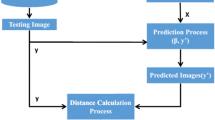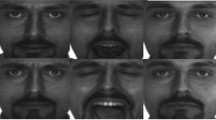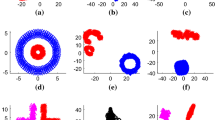Abstract
A novel kernel discriminant transformation (KDT) algorithm based on the concept of canonical differences is presented for automatic face recognition applications. For each individual, the face recognition system compiles a multi-view facial image set comprising images with different facial expressions, poses and illumination conditions. Since the multi-view facial images are non-linearly distributed, each image set is mapped into a high-dimensional feature space using a nonlinear mapping function. The corres-ponding linear subspace, i.e. the kernel subspace, is then constructed via a process of kernel principal component analysis (KPCA). The similarity of two kernel subspaces is assessed by evaluating the canonical difference between them based on the angle between their respective canonical vectors. Utilizing the kernel Fisher discriminant (KFD), a KDT algorithm is derived to establish the correlation between kernel subspaces based on the ratio of the canonical differences of the between-classes to those of the within-classes. The experimental results demonstrate that the proposed classification system outperforms existing subspace comparison schemes and has a promising potential for use in automatic face recognition applications.
Preview
Unable to display preview. Download preview PDF.
Similar content being viewed by others
References
Arandjelović, O., Shakhnarovich, G., Fisher, J., Cipolla, R., Darrell, T.: Face Recognition with Image Sets Using Manifold Density Divergence. In: IEEE Conf. on Computer Vision and Pattern Recognition(CVPR), vol. 1, pp. 581–588 (2005)
Baudat, G., Anouar, F.: Generalized Discriminant Analysis Using a Kernel Approach. Neural Computation 12(10), 2385–2404 (2000)
Belhumeur, P.N., Hespanha, J.P., Kriegman, D.J.: Eigenfaces vs. Fisherfaces: Recognition Using Class Specific Linear Projection. IEEE Trans. on Pattern Analysis and Machine Intelligence(PAMI) 19(7), 711–720 (1997)
Chatelin, F.: Eigenvalues of matrices. John Wiley & Sons, Chichester (1993)
Fukui, K., Stenger, B., Yamaguchi, O.: A Framework for 3D Object Recognition Using the Kernel Constrained Mutual Subspace Method. In: Asian Conf. on Computer Vision, pp. 315–324 (2006)
Fukui, K., Yamaguchi, O.: Face Recognition Using Multi-Viewpoint Patterns for Robot Vision. In: International Symposium of Robotics Research, pp. 192–201 (2003)
Kim, T.K., Kittler, J., Cipolla, R.: Discriminative Learning and Recognition of Image Set Classes Using Canonical Correlations. IEEE Trans. on PAMI 29(6), 1005–1018 (2007)
Penev, P.S., Atick, J.J.: Local Feature Analysis: A General Statistical Theory for Object Representation. Network: Computation in Neural systems 7(3), 477–500 (1996)
Sakano, H., Mukawa, N.: Kernel Mutual Subspace Method for Robust Facial Image Recognition. In: International Conf. on Knowledge-Based Intelligent Engineering System and Allied Technologies, pp. 245–248 (2000)
Satoh, S.: Comparative Evaluation of Face Sequence Matching for Content-Based Video Access. In: IEEE Conference on Automatic Face and Gesture Recognition (FG), pp. 163–168. IEEE Computer Society Press, Los Alamitos (2000)
Schölkopf, B., Smola, A., Müller, K.-R.: Nonlinear Component Analysis as A Kernel Eigenvalue Problem. Neural Computation 10(5), 1299–1319 (1998)
Shakhnarovich, G., Fisher, J.W., Darrel, T.: Face Recognition from Long-Term Observations. In: European Conference on Computer Vision, pp. 851–868 (2000)
Shakhnarovich, G., Moghaddam, B.: Face Recognition in Subspaces. Handbook of Face Recognition (2004)
Turk, M., Pentland, A.: Face Recognition Using Eigenfaces. CVPR, 453–458 (1993)
Viola, P., Jones, M.: Robust Real-Time Face Detection. International Journal of Computer Vision 57(2), 137–154 (2004)
Wolf, L., Shashua, A.: Kernel Principal Angles for Classification Machines with Applications to Image Sequence Interpretation. CVPR, 635–642 (2003)
Yamaguchi, O., Fukui, K., Maeda, K.: Face Recognition Using Temporal Image Sequence. FG (10), 318–323 (1998)
Yang, M.-H.: Kernel Eigenfaces vs. Kernel Fisherfaces: Face Recognition Using Kernel Methods. FG, 215–220 (2002)
Author information
Authors and Affiliations
Editor information
Rights and permissions
Copyright information
© 2007 Springer-Verlag Berlin Heidelberg
About this paper
Cite this paper
Chu, WS.V., Chen, JC., Lien, JJ.J. (2007). Kernel Discriminant Analysis Based on Canonical Differences for Face Recognition in Image Sets. In: Yagi, Y., Kang, S.B., Kweon, I.S., Zha, H. (eds) Computer Vision – ACCV 2007. ACCV 2007. Lecture Notes in Computer Science, vol 4844. Springer, Berlin, Heidelberg. https://doi.org/10.1007/978-3-540-76390-1_69
Download citation
DOI: https://doi.org/10.1007/978-3-540-76390-1_69
Publisher Name: Springer, Berlin, Heidelberg
Print ISBN: 978-3-540-76389-5
Online ISBN: 978-3-540-76390-1
eBook Packages: Computer ScienceComputer Science (R0)




